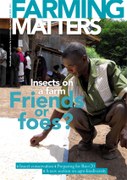Ask a person (a farmer, an agrochemical vendor, an extension worker or a scientist) what she thinks of the role of insects in agriculture, and you will quickly learn about that person’s perspective on agriculture and ecology.
Fear of insects is widespread, and based on an incomplete or distorted understanding of what insects do in an agro-ecosystem. This fear has been fuelled by agrochemical companies, the global seed industry and more generally by the type of thinking that underlies modern “industrialised” agriculture.
Small-scale farmers have been made to believe that all insects are evil creatures and that the only effective way to deal with them is to kill them all by spraying them with pesticides. Or by using genetically modified seed that has an in-built resistance to certain (but not all) insect pests, such as Bt cotton.
Modern agriculture has estranged farmers from their natural environment, and from their own knowledge about this environment. This is one of the main causes of increasing impoverishment of small-scale farming communities around the world. This is why knowledge about insects is important. Knowledge about agro-ecosystems – the crops and their larger environment – empowers farmers to think beyond short-term solutions.
Insects show us how all parts of the system are interconnected and how deadly the consequences can be if we unnecessarily tamper with them. There are effective ways to deal with pests and diseases that do not destroy ecosystems but work with them. They are well-known but do not get sufficient policy support.
The message to be taken to Rio+20 is that a “green economy” can only exist with an agriculture that respects people and ecosystems – including insects! Einstein (quoted in this issue of Faming Matters by John Wightman) had it clear when he said that “the bee is the basis of life on this earth.” It’s time to think, and to act. Now.
Text: Edith van Walsum, director ILEIA

